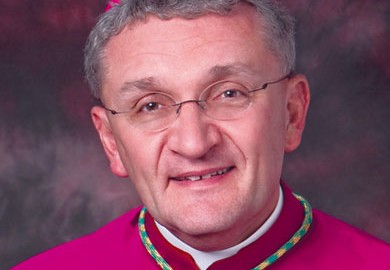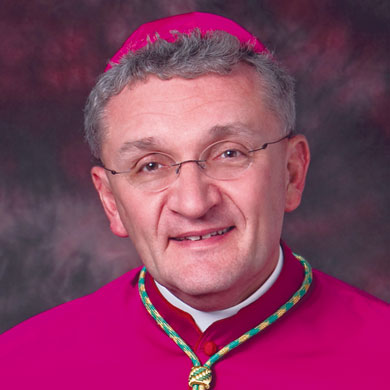Our Campaign for The Church Alive! is our way to be the body of Christ in an even better way than we have been in the past.
The Church of Pittsburgh is 170 years old and we’ve never done a campaign like this before. We’ve never dug so deeply into our hearts and maybe into our own resources and our own talents to really make our mark.
Our Campaign for The Church Alive! is an opportunity for us to respond to the trust that Jesus gave to his disciples and all of us who are his disciples now, to prove to the world how much God is alive and how much he wants to reach out to us.
It’s important for us to focus on the parishes in this campaign because that’s where the majority of our faithful most often come together as church.
I’ve asked pastors and parish leaders to take a look at opportunities where the faith community not only can come together, but be excited to come together to provide extraordinary resources so that each parish and the Church of Pittsburgh can again show how much life there is within us.
Every parish in every given year has resources coming in to take care of the ordinary day-to-day outreach of the parish, whether in education or social service or in worship. This campaign is meant to go beyond all of those things. It’s an invitation for people to be a part of an effort to do things that parishes haven’t otherwise been able to realize.
This campaign is an opportunity to once again reach out through each of us with the hands, the heart and the face of Christ.
So many of you, the women, men and youth of our church, have a love for the church. You have been blessed with so many capabilities and gifts which really make the Church Alive.
The campaign will help develop even stronger and more active lay leaders. Through the implementation of nationally known programs in the Church of Pittsburgh, we will help to develop strong leaders for many years to come.
This campaign reaches out to provide for them the best possible education so they may be prepared the best way they can be to serve you, the people of the Church of Pittsburgh.
We need to take a look at it on three levels. First, the education of our young people through the great tradition of our Catholic schools.
Second, the passing on of the faith through very strong catechetical programs through our religious education programs in every one of our parishes.
And third of all, Catholic education means ongoing formation and education for our adults, because we can never reach a point in our lives where we know everything about our faith.
So many people who know the Catholic Charities Free Health Care Center call it the “Miracle on Ninth Street,” and that’s so true. Last year alone, 81,000 people were served by Catholic Charities, many of whom came to the center to have check-ups, to have dental work done, to have a sense of hope at moments of their desperate need.
And while Catholic Charities has its own annual campaign to support all of their programs, I think we’ve got to reach out with our resources to supplement the work that’s being accomplished. When we do so, we’re bringing comfort and solace to so many people who are in need.
I don’t think there is a family in our church that wouldn’t be able to tell a story of somebody in their family who’s left the church, for one reason or another. It’s important for us to find out why they left and to welcome them back.
We also need to invite other people who’ve never been a part of the church to come and take a good look at us.
After all, isn’t that what Jesus asked those early disciples to do when he placed the trust in them to be his body, the body of Christ as the church, to go forth and make disciples of all nations?
One of the challenges I was given was to teach a course that was called “Christian Lifestyles.” I taught that there are really four vocations in life — the married life, the single life, the consecrated life and the ordained life. God has a plan for every single one of us. It’s important for us to know what that plan is because, in effect, our vocation becomes our ticket to heaven.
I would say to the students, “If you don’t remember anything else, I want you to remember this: a Christian vocation means that every person whom we meet, we must love as if they are Christ, and every person whom we meet we must treat them as if we are Christ.”
It’s exactly what Jesus calls us to do and to be as church.
Sometimes we think more about our troubles instead of our blessings, don’t we?
If we really open our eyes, everything that we see about us is a blessing. Starting, first of all, with the image that we see in the mirror.
Then we’ve got to see the blessing of faith because it’s really the blessing of the faith that helps us to see God.
Then there is the blessing of what it means to be family. Families who give us life, who encourage us. It’s important for us to be able to see the blessing of friendship and what that does to help our hearts and souls soar.
All of those realities — the blessing of life, the blessing of faith, the blessing of family, the blessing of friendship — come together in the various components of what it really means to be church.
It’s clear that we can’t separate our faith from what we do — in our workplaces, in our offices, in our schools, in our family rooms, when we’re driving, at the mall. Faith has to be evident. Our words and our deeds have to show there’s a real connection with God.
We can’t be schizophrenic about our faith, seeing our faith relegated somehow only to what we do when we come to church on Sunday to worship and nothing more.
That was never the practice of Jesus. One of the things I love so much about Jesus as the Savior is he always did his thinking outside the box. He always broke through walls. Where people thought that they were hopeless, he gave them hope. Where people were dealing with sins in their lives, he freed them of their sins. Where people were dealing with any form of disability in their lives, he healed them. Where people were blind, either physically or emotionally, he opened their eyes.
That kind of work is still being done in the church. And it’s up to us to be the hands, the heart, the face of Jesus himself, to and for others, especially when they face the darkest moments of their lives.
Many people look at the word “sacrifice” and say, well, that means pain. You know, giving up candy or not having a cocktail during the Lenten season or beyond.
And yet, it is exactly the opposite. The word “sacrifice” comes from two Latin words, “sacrum facere,” to make holy. Whenever we talk about sacrificial giving, what we’re talking about is not so much denying something for myself, but really taking a look at what it means to give what I might use for myself, to use it for the benefit of the work of the church.
Whenever we talk about inviting people to be sacrificial givers for the campaign, what it means is foregoing something that I might like to do for myself, so that I might be able to give it for the benefit of somebody else.
There’s a joy that comes in giving to others that is the definition of Christ’s love.
As we continue our work as church and as we continue this important campaign, I really beg God’s blessing on all of us that what we do really begins with his inspiration — and that all that we do is brought to a successful completion by the gift of his grace.

